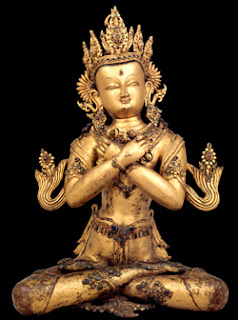TYPES OF NEPALESE ART
 |
| NEPALESE METAL SCULPTURE |
Art is the product of creative human activity in which materials are shaped or selected to convey an idea, emotion, or visually interesting form. The word art can refer to the visual arts, including painting, sculpture, architecture, photography, decorative arts, crafts, and other visual works that combine materials of forms. We also use the word art in a more general sense to encompass other farms of creative activity, such as dance and music, or even to describe skill in almost any activity.
 |
| CLASSICAL DANCE, NEPAL |
Dance is an art form that generally refers to' movement of the body, usually rhythmic and to music, used as a form of expression, social interaction or presented it a spiritual or performance setting. Dance is also used to describe methods of nonverbal communication (like body language) between humans or animals (bee dance, patterns of behavior such as a mating dance), motion in inanimate objects (i.e. the leaves danced in the wind), and certain musical forms or genres.
 |
| WATER COLOUR ART OF NEPALESE CHILD |
Handicraft also known as craft work or simply craft, is a type of work where useful and decorative devices are made completely by hand or using only simple tools. Usually the term is applied to traditional means of making goods. The individual adisanship of the items is a paramount criterion such items often have cultural and/or religious significance. Items made by mass production or machines are not handicrafts.
 |
| GODS SCULPTURE IN NEPALESE TEMPLE, KATHMANDU |
 |
| LIVE GOD "KUMARI", KATHMANDU |
Pottery is the ceramic ware made from clay by potters. Major types of pottery include earthenware, stoneware, and porcelain. The places: where such wares are made are called potteries. Pottery is one of the oldest human technologies and art forms, and remains a major industry today. Ceramic art covers the ad of pottery, whether in items made for use or purely for decoration. Pottery is made by forming a clay body into objects of a required shape and heating them to high temperatures in a kiln to induce reactions that lead to permanent changes, including increasing their strength and hardening and setting their shape. In all these arts, human skill is applied. Genius of an individual artist is exposed. Ideas, emotions and feelings are expressed. Certain beauty is exposed by an artist, and that is felt and realized by the audience. They are same for those exposure, expression and realization. However, dance and music are abstract, invisible arts because the performance is realized. Handicrafts and pottery are visual and concrete forms of art. The former do not have utilitarian value but the latter do have. In spite of the similarities and differences, all these arts have social values they do carry cultural, religious and also regional colours.
FREE SOFTWARE:




